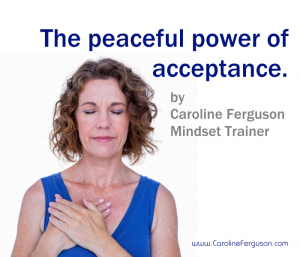- You are here:
- Home
- Blog
- Mindset optimisation series
- The Peaceful Power of Acceptance

Acceptance mindset
Coaches and therapists often talk about the need for ‘acceptance’, but often we resist.
I was talking to a client this morning about how helpful it is to take an ‘accepting’ view – of ourselves, of others, of things that happen and of situations in which we find ourselves.
She said, “But I can’t accept the fact that my business partner let me down. If I accept that, then it means what she did was OK. And that kind of betrayal is NOT OK.”
Her response is understandable but it reflects a common misconception: that acceptance means approval. Let’s get clear on this: acceptance does NOT mean that you have to approve of a situation, or that you condone your own or someone else’s poor behaviour.
Accepting simply means that you make a conscious decision not to fight the fact that something is real, or to judge, or wind yourself up that it shouldn’t be happening.
Accepting empowers you to:
- Work towards a better outcome, rather than remaining stuck with negative emotions like anger, anxiety, shame and hurt. You can start challenging those automatic thoughts you have in tricky situations and find a more helpful way to think.
- Understand that you’re (or someone else is) intrinsically worthwhile – in spite of your/their behaviour.
- Rise above a challenging situation and become more resilient and tolerant.
- Stop battling with those futile “it shouldn’t have happened!” beliefs and feelings and focus on finding solutions and taking action.
So how do you overturn a lifetime habit of negative judgement and resisting acceptance?
1. First you have to tune in and get used to listening to the voice in your head, especially in difficult situations. That way you can catch the beliefs that are derailing you as they crop up, and challenge them.
2. Then you can consciously choose a more helpful way to think – one that might sound a bit like this:
“OK, I accept that it happened. I didn’t like it much but I’ve survived it. It doesn’t mean that they – or I, or the world – are less worthwhile, just that we’re flawed and normal. So what would be the best outcome in this situation? And what can I think, say and do to make that happen?”
3. Then you’re much better equipped, cognitively and emotionally, to take deliberate action to minimise the fallout and create a better result.
When you consciously make the decision to accept something or someone that you find challenging, you’re better able to:
- stop wishing that it hadn’t happened and face up to the fact that it did, allowing you to process it and recover.
- stop making value judgements about the situation and focus instead on learning and moving on.
- stop devaluing yourself by tying your self worth to what happened.
- focus on solutions to repair the damage, rather than dwelling on the damage itself.
Most of all, acceptance is about choosing not to agitate yourself any further about something that you’ve been hanging on to, or that you’ve felt powerless to change.
What you CAN change, by accepting, is that you won’t allow that thing to keep you stuck for one minute longer. You’re deliberately choosing to feel more peaceful from this moment on.
If you’d like some help with this, or any other Mindset issue, contact me to see if it might be of use to have a free Mindset Clarity session via Skype.
Good luck – let me know how you get on with practising acceptance.
About the Author
Caroline is a Mindset Trainer and speaker who works with sensitive, high-potential leaders who know they were born for something more. She shows them how to beat mindset blocks and habits, such as limiting beliefs, low self worth and procrastination, that are preventing them from making a bigger impact.